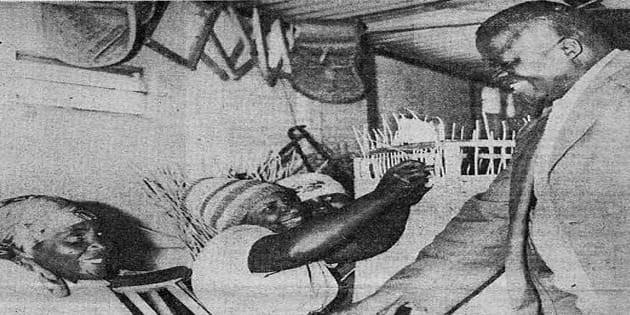The Inspired Goatherd

Jairos Jiri’s compassion for the disabled was extraordinary: a hope to the afflicted and an inspiration to the community at large. (photo The Rhodesia Herald, Oct 28, 1968)
The Inspired Goatherd
Born in 1921, Jairos Jiri was a Matebele from the Rozwi people, known for their craftsmanship, perhaps the builders of Great Zimbabwe. Being the first born, he herded the family cattle instead of attending school. He ran away at the age of twelve. As a goatherd for two European women he earned three shillings a month. They taught him the three R’s in the vernacular.
Eventually he moved to Bulawayo and joined the army. He worked as a dishwasher for the RAF (Royal Air Force) during the war. American soldiers told him they had special hospitals and associations to train the blind and the crippled.
The Inspired Goatherd
Working at a bottle store after WWII, he took in handicapped soldiers in his two-roomed location house. As necessity arose, he transported them to Bulawayo’s Mpilo Hospital on the carrier of his bicycle for treatment. Mr. Johannes du Plessis, the Compound manager recognized Jairos’ “committee of action” consisting of himself, a cousin and a friend.
Jairos raised money to show that blind people could be taught to help themselves. He arranged for a blind band to play to African audiences. He sold newspapers in the mornings and soft drinks at weekend football matches. He opened a stall on his veranda. Arrested for illicit trading by the police, Mr. du Plessis quickly issued him with a license.
The municipality then gave Jairos a room in the township on three months probation. He immediately employed an old alcoholic cobbler. Guided by him, Jairos acquired the equipment needed to set up shop on credit. The first trainee was Josef Ncube, who was reluctant at first, as he was used to begging. That was the beginning of Jairos’ training school. He said “our experience is, so long as they have hands, they are able to do something.”
In 1955 his organization went national when it received a government grant. He left his job at the bottle store. The municipality and the Beit Trust made donations. Finally, with twenty thousand pounds and a grant of land, the association built its first center for training and housing more than one hundred adults and children in Bulawayo.
Assistance grew: from Oxfam, the State Lottery, Royal Commonwealth Society for the Blind and many individuals. Five centers were built in the country with an annual budget of thirty-five thousand pounds. One of these centers was in Gwelo, forty miles from Que Que. Mom got permission for a contingent from Self Help to visit the Gwelo Center.
